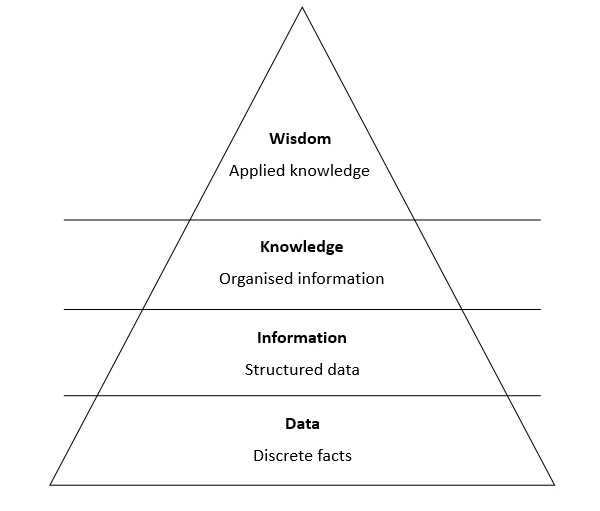Knowledge

|
Very broadly, the term ‘knowledge’ refers to organised information, such as might be found in a report.
It is differentiated from data - which refers to discrete facts (numbers and characters that in themselves have no meaning) and information - which is data that has been structured so that it does have meaning (such as text or a table).
The application of knowledge is sometimes referred to as wisdom.
Knowledge can be explicit knowledge, which has been codified and recorded, or tacit knowledge, which is experiential and more difficult to formalise.
The construction industry is a knowledge-based industry, which depends on knowledge and high skill levels, and has an increasing need for ready access to knowledge. Knowledge is vital to the construction industry, defining what is required, setting standards and explaining what is possible. It includes legislation, regulations, policy, best practice, research, innovations, news and so on. For more information see: Types of construction knowledge.
However, unlike data and information, which tend to be project based and so have clear authorship, ownership, responsibility and control, knowledge tends to be industry-wide and intra project, with no overall controlling mind. As a result, tt is fragmented, inconsistent, sometimes contradictory, and often hidden behind pay walls and membership sign ups, or held on private intranets.

|
The Construction Knowledge Task Group is working to improve the standardisation of, and access to knowledge by practitioners.
Articles about knowledge on Designing Buildings include:
- Concept-knowledge theory.
- Construction knowledge sources.
- Construction knowledge survey.
- Construction knowledge.
- Data.
- Indigenous knowledge.
- Knowledge based economy.
- Knowledge classification.
- Knowledge gap.
- Knowledge management in construction.
- Knowledge pyramid.
- Knowledge standard.
- Knowledge task group.
- Local knowledge.
- Specification for Discoverable Construction Knowledge.
- Traditional knowledge.
- Types of construction knowledge.
Featured articles and news
Infrastructure that connect the physical and digital domains.
Harnessing robotics and AI in challenging environments
The key to nuclear decommissioning and fusion engineering.
BSRIA announces Lisa Ashworth as new CEO
Tasked with furthering BSRIA’s impressive growth ambitions.
Public buildings get half a million energy efficiency boost
£557 million to switch to cleaner heating and save on energy.
CIOB launches pre-election manifesto
Outlining potential future policies for the next government.
Grenfell Tower Inquiry announcement
Phase 2 hearings come to a close and the final report due in September.
Progress from Parts L, F and O: A whitepaper, one year on.
A replicated study to understand the opinion of practitioners.
ECA announces new president 2024
Electrical engineer and business leader Stuart Smith.
A distinct type of countryside that should be celebrated.
Should Part O be extended to existing buildings?
EAC brands heatwave adaptation a missed opportunity.
Definition of Statutory in workplace and facilities management
Established by IWFM, BESA, CIBSE and BSRIA.
Tackling the transition from traditional heating systems
59% lack the necessary information and confidence to switch.
The general election and the construction industry
As PM, Rishi Sunak announces July 4 date for an election.
Eco apprenticeships continue help grow green workforce
A year after being recognised at the King's coronation.
Permitted development rights for agricultural buildings
The changes coming into effect as of May 21, 2024.





















